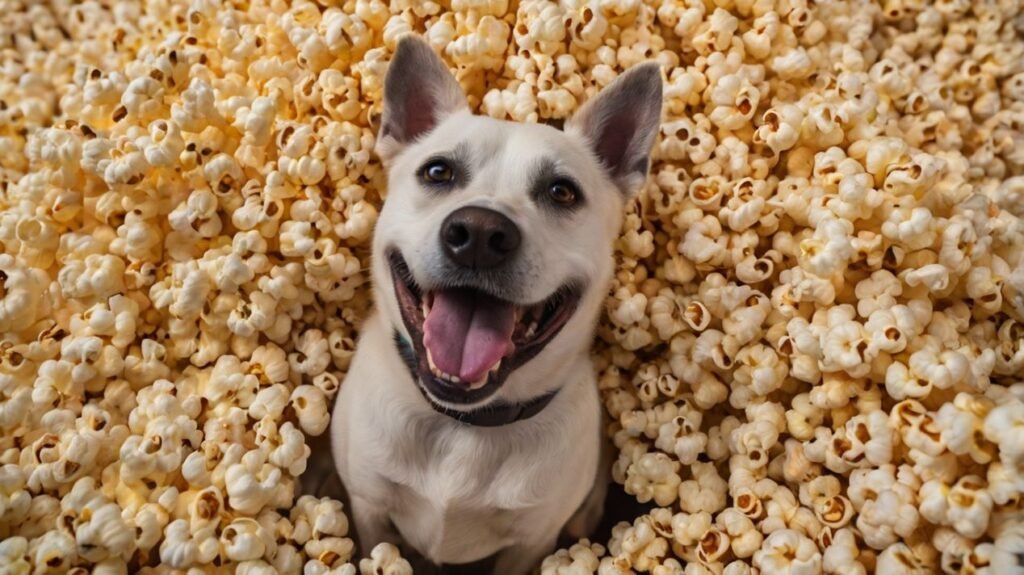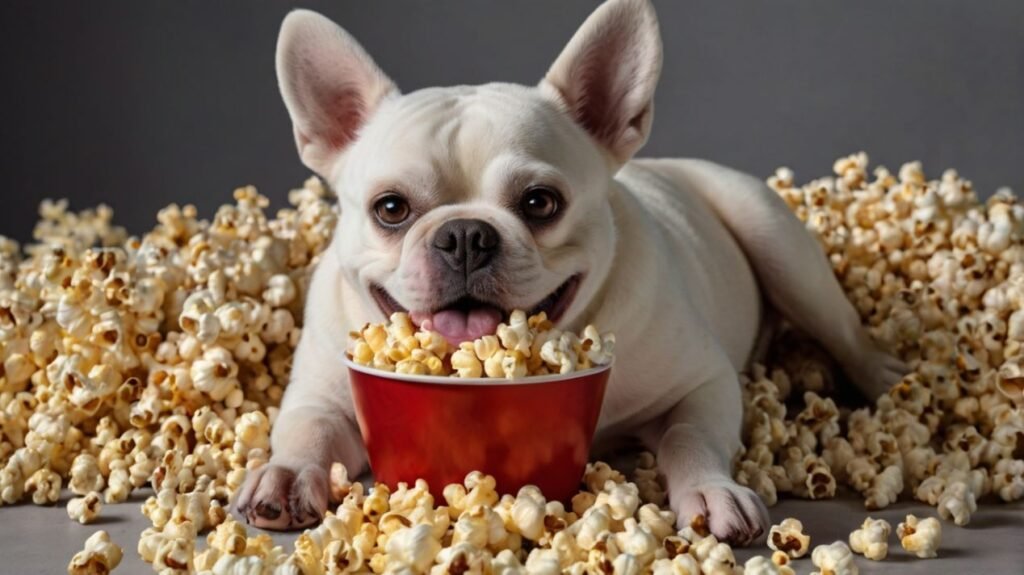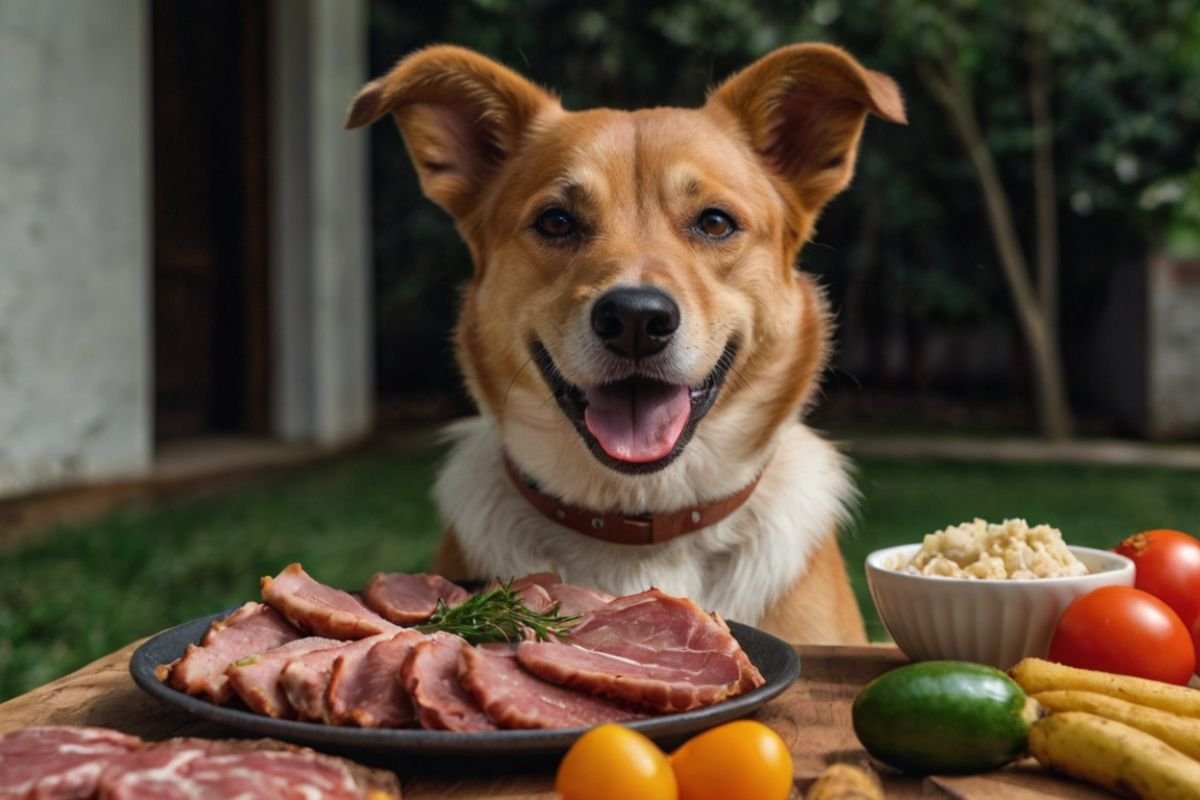Picture this: You’re lounging on your couch. A big bowl of buttery popcorn sits in your lap. Your furry friend gives you those irresistible puppy eyes. Then, you wonder: “Can my dog have some popcorn too?”
This question pops up more often than you might think. Moreover, the answer isn’t as simple as yes or no. Therefore, let’s dive deep into this topic together.
As a dog lover myself, I’ve faced this exact situation countless times. Furthermore, I’ve learned that making informed decisions about our pets’ diet is crucial. In fact, what seems harmless to us can sometimes harm our four-legged friends.
So, can dogs eat popcorn? Well, the short answer is yes, but with important conditions. Additionally, there are many factors to consider first. Let’s explore this topic step by step.

Table of Contents
The Basic Answer: Yes, But With Conditions
Dogs can eat plain, air-popped popcorn in small amounts. However, this comes with several important rules. First, the popcorn must be completely plain. Second, it should be given only as an occasional treat. Third, you must watch for any bad reactions.
Plain popcorn isn’t toxic to dogs. In fact, it can be a low-calorie snack option. Nevertheless, most store-bought popcorn contains harmful ingredients. Therefore, preparation matters a lot.
The key word here is “plain.” This means no butter, salt, oil, or seasonings. Additionally, it means no artificial flavors or preservatives. Most importantly, it means no chocolate or caramel coatings.
Also read, Can Dogs Eat Corn?
Why Plain Popcorn Can Be Okay for Dogs
Plain popcorn offers some benefits for dogs. First, it’s low in calories. Second, it contains fiber. Third, it provides small amounts of certain nutrients.
One cup of plain popcorn has only about 30 calories. Furthermore, it contains trace amounts of vitamins and minerals. These include magnesium, phosphorus, and zinc. However, these nutrients are minimal.
The fiber in popcorn can help with digestion. Nevertheless, dogs don’t need much fiber in their diet. Therefore, popcorn should never replace their regular food.
Plain popcorn also satisfies a dog’s urge to chew. Moreover, the crunchy texture can be enjoyable for them. But remember, this should be an occasional treat only.
The Dangerous Side of Popcorn for Dogs
Most commercial popcorn poses serious risks to dogs. These risks come from added ingredients. Let’s examine each danger carefully.
Salt: The Silent Killer
Salted popcorn is dangerous for dogs. Too much salt can cause sodium poisoning. Furthermore, it leads to excessive thirst and urination. Additionally, it can cause vomiting and diarrhea.
In severe cases, salt poisoning causes seizures. It can also lead to coma or death. Therefore, never give your dog salted popcorn.
Dogs need very little sodium in their diet. In fact, their regular food provides enough salt. Adding more through treats can quickly become harmful.
Butter and Oil: Fat Overload
Butter and oil make popcorn taste great to us. However, they’re terrible for dogs. These fats can cause stomach upset immediately. Moreover, they can lead to pancreatitis over time.
Pancreatitis is a serious condition. It causes severe pain and vomiting. Furthermore, it can be life-threatening. Additionally, it often requires expensive veterinary treatment.
Dogs process fats differently than humans do. Therefore, what seems like a small amount to us can overwhelm their system. This is especially true for small dogs.
Artificial Flavors and Seasonings
Many popcorn varieties contain artificial flavors. These chemicals can be toxic to dogs. Furthermore, seasonings like garlic powder are extremely dangerous.
Garlic and onion powders are particularly harmful. They can damage a dog’s red blood cells. This condition is called hemolytic anemia. Moreover, it can be fatal if untreated.
Cheese powder is another common additive. While not toxic, it’s very high in fat and sodium. Therefore, it poses the same risks as butter and salt.
Sugar and Sweet Coatings
Caramel corn and kettle corn contain lots of sugar. Dogs don’t process sugar well. Furthermore, too much sugar can cause diabetes over time.
Chocolate-coated popcorn is extremely dangerous. Chocolate is toxic to dogs. Even small amounts can cause poisoning. Therefore, never give your dog any chocolate-flavored treats.
Unpopped Kernels: Choking and Tooth Hazards
Unpopped kernels pose serious physical risks. First, they can cause choking. Second, they can break teeth. Third, they can get stuck in the digestive tract.
These hard kernels are especially dangerous for small dogs. Furthermore, they can cause intestinal blockages. This condition requires emergency surgery.
Always remove all unpopped kernels before sharing. Additionally, check the popcorn carefully. Even small pieces of hard kernel can cause problems.
How Much Popcorn Is Safe?

The amount of safe popcorn depends on your dog’s size. However, the general rule is “very little.” Moreover, it should be an occasional treat only.
For small dogs under 20 pounds, just a few pieces are enough. Medium dogs can have up to a quarter cup. Large dogs might handle half a cup safely.
However, these amounts should be given rarely. Furthermore, they should never replace regular meals. Additionally, watch your dog carefully after giving any new treat.
Remember that treats should make up less than 10% of your dog’s daily calories. Therefore, even safe amounts of popcorn can add up quickly.
Signs Your Dog Shouldn’t Eat Popcorn
Some dogs should never eat popcorn. Additionally, certain signs indicate your dog has had too much. Let’s explore these warning signs.
Pre-existing Health Conditions
Dogs with diabetes shouldn’t eat popcorn. Furthermore, dogs with kidney disease should avoid it. Additionally, dogs with heart problems need to limit sodium intake.
Overweight dogs should also avoid popcorn. Even plain popcorn adds unnecessary calories. Therefore, stick to their regular diet plan.
If your dog has food allergies, be extra careful. Corn is a common allergen for dogs. Moreover, cross-contamination during processing can introduce other allergens.
Warning Signs After Eating Popcorn
Watch for these symptoms after your dog eats popcorn:
Vomiting is the most common reaction. Furthermore, diarrhea often follows. Additionally, excessive thirst indicates too much salt.
Loss of appetite is another warning sign. Moreover, lethargy suggests digestive upset. If these symptoms persist, call your vet immediately.
Difficulty breathing is a serious emergency sign. Furthermore, seizures require immediate veterinary care. Additionally, any sign of choking needs urgent attention.
The Right Way to Give Popcorn to Dogs
If you decide to share popcorn with your dog, follow these steps carefully. First, make your own air-popped popcorn. Second, let it cool completely. Third, remove all unpopped kernels.
Making Dog-Safe Popcorn
Use an air popper or plain pot with a lid. Add no oil, butter, or seasonings. Furthermore, use plain popcorn kernels only.
Heat the kernels until they’re fully popped. Then, let everything cool down completely. Hot popcorn can burn your dog’s mouth.
Check every piece carefully. Remove any unpopped or partially popped kernels. Additionally, break large pieces into smaller ones.
Serving Guidelines
Start with just one or two pieces. Then, wait and watch for reactions. If your dog handles it well, you can gradually increase the amount.
Never give popcorn as a meal replacement. Furthermore, don’t make it a daily treat. Instead, save it for special occasions.
Always supervise your dog while they eat popcorn. Moreover, ensure they chew properly before swallowing. Additionally, provide fresh water nearby.
Better Treat Alternatives
While plain popcorn can be okay occasionally, better alternatives exist. These treats are safer and more nutritious for dogs.
Healthy Homemade Options
Sweet potato slices make excellent treats. Furthermore, they’re packed with nutrients. Additionally, most dogs love their natural sweetness.
Frozen banana pieces are another great option. They’re especially good on hot days. Moreover, they provide potassium and vitamins.
Plain rice cakes can satisfy the crunch craving. Furthermore, they’re easier to digest than popcorn. Additionally, they have fewer choking risks.
Commercial Dog Treats
High-quality commercial treats are often the best choice. They’re specifically designed for dogs. Furthermore, they meet nutritional requirements.
Look for treats with simple ingredients. Additionally, choose ones appropriate for your dog’s size. Moreover, read reviews from other dog owners.
Single-ingredient treats are often the safest. These include freeze-dried meats or vegetables. Furthermore, they have fewer additives.
What to Do if Your Dog Eats Bad Popcorn
Accidents happen. Sometimes dogs get into popcorn they shouldn’t eat. Therefore, knowing what to do is important.
Immediate Steps
First, don’t panic. Then, assess what your dog ate. Furthermore, estimate how much they consumed.
Remove any remaining popcorn immediately. Additionally, check your dog’s mouth for stuck pieces. Moreover, provide fresh water.
Watch your dog closely for the next few hours. Furthermore, note any changes in behavior. Additionally, prepare to call your vet if needed.
When to Call the Vet
Call your vet if your dog shows any concerning symptoms. These include vomiting, diarrhea, or excessive thirst. Furthermore, difficulty breathing requires immediate attention.
If your dog ate chocolate popcorn, call immediately. Additionally, contact your vet if they consumed large amounts of salted popcorn. Moreover, any signs of choking need urgent care.
Don’t wait for symptoms to worsen. Furthermore, it’s better to be safe than sorry. Additionally, your vet can provide specific guidance based on your dog’s situation.
The Science Behind Dogs and Corn
Understanding how dogs digest corn helps explain the popcorn question. Dogs can digest corn, but not as efficiently as humans. Furthermore, their digestive systems are designed primarily for meat.
Corn provides carbohydrates and some nutrients. However, dogs don’t require corn in their diet. Moreover, too much corn can cause digestive upset.
The processing that creates popcorn makes corn easier to digest. Nevertheless, the added ingredients often make it harmful. Therefore, plain preparation is crucial.
Some dogs are allergic to corn entirely. Furthermore, this allergy can develop over time. Additionally, corn allergies can cause skin problems and digestive issues.
Training and Popcorn: A Word of Caution
Never use popcorn as a training treat. Training treats need to be small and quickly consumed. Furthermore, they should be extremely high-value to your dog.
Popcorn is too bulky for effective training. Additionally, the choking risk makes it unsuitable. Moreover, you need treats you can give repeatedly without health concerns.
Instead, use tiny pieces of chicken or cheese. Furthermore, commercial training treats work well. Additionally, these options are safer and more effective.
Special Considerations for Different Dog Breeds
Some breeds have specific considerations regarding popcorn. Small breeds face higher choking risks. Furthermore, their smaller stomachs mean even tiny amounts can cause problems.
Brachycephalic breeds (flat-faced dogs) have additional concerns. These dogs already have breathing difficulties. Therefore, any choking risk is magnified.
Giant breeds might seem like they can handle more popcorn. However, they’re actually more prone to bloat and digestive issues. Therefore, the same cautions apply.
Age Matters: Puppies vs. Senior Dogs
Puppies shouldn’t eat popcorn at all. Their digestive systems are still developing. Furthermore, they’re more prone to choking on small objects.
Senior dogs also need special consideration. They may have dental issues that make chewing difficult. Additionally, they’re more likely to have health conditions that make popcorn risky.
Adult dogs in good health are the safest candidates for occasional plain popcorn treats. However, all the previous guidelines still apply.
The Environmental Factor
Consider where your popcorn comes from. Movie theater popcorn is especially dangerous for dogs. It contains excessive amounts of salt, butter, and artificial flavors.
Microwave popcorn often contains harmful chemicals. Furthermore, the bags themselves can be toxic if eaten. Therefore, homemade is always safer.
Even “natural” flavored popcorns can contain harmful ingredients. Therefore, always read labels carefully. Additionally, when in doubt, don’t share.
Making the Right Choice for Your Dog
Every dog is different. What works for one might not work for another. Therefore, consider your individual dog’s needs.
Think about your dog’s health history. Furthermore, consider their size and age. Additionally, evaluate their typical reaction to new foods.
If you’re unsure, consult your veterinarian. They know your dog’s specific health needs. Moreover, they can provide personalized advice.
Remember that your dog doesn’t need popcorn to be happy. Furthermore, there are many safer treat options available. Additionally, your love and attention matter more than any snack.
Conclusion
So, can dogs eat popcorn? Yes, they can eat plain, air-popped popcorn in very small amounts occasionally. However, most popcorn products are dangerous for dogs due to added ingredients.
The risks often outweigh the benefits. Furthermore, better treat alternatives exist. Therefore, consider whether popcorn is really worth it for your furry friend.
If you do choose to share popcorn, follow all safety guidelines carefully. Moreover, watch your dog closely for any reactions. Additionally, don’t hesitate to contact your vet with concerns.
Remember, being a responsible dog owner means making informed decisions. Furthermore, it means prioritizing your dog’s health over convenience. Your furry friend depends on you to keep them safe.
The next time those puppy eyes beg for popcorn, you’ll know exactly what to do. Moreover, you’ll understand both the risks and the safe practices. Most importantly, you’ll make the best choice for your beloved companion.
After all, there’s nothing more important than keeping our furry family members healthy and happy. Therefore, when in doubt, choose the safer option. Your dog will thank you for it in the long run.

Shahriar Robin is the creator of WhatPetsCanEat.com, a passionate pet lover and dedicated cat dad to Rio, a curious two-year-old orange feline who inspired this website. With a love for animals and a knack for research, Shahriar shares trusted, easy-to-understand information to help fellow pet owners make safe, healthy food choices for their furry friends.


